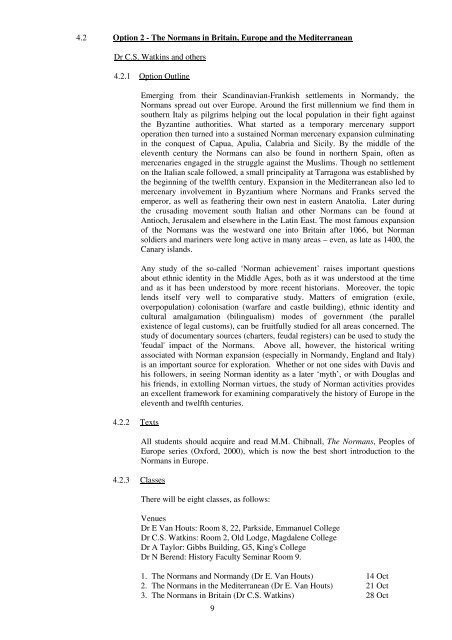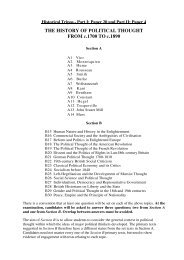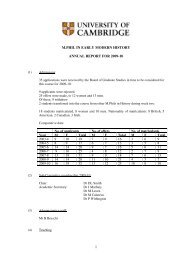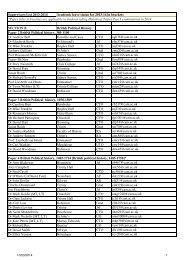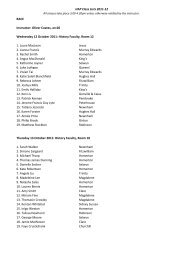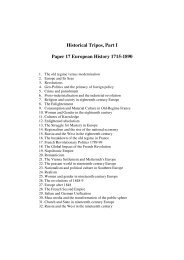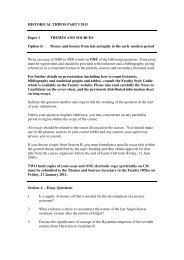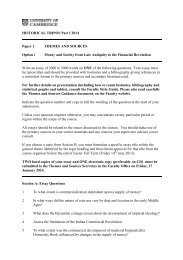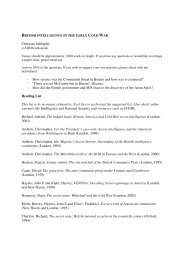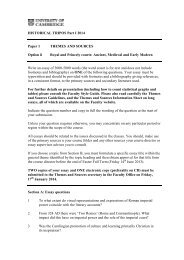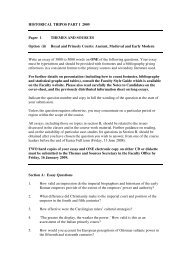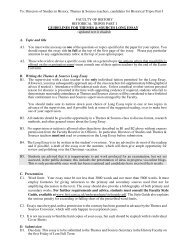Course Handbook - Faculty of History
Course Handbook - Faculty of History
Course Handbook - Faculty of History
Create successful ePaper yourself
Turn your PDF publications into a flip-book with our unique Google optimized e-Paper software.
4.2 Option 2 - The Normans in Britain, Europe and the Mediterranean<br />
Dr C.S. Watkins and others<br />
4.2.1 Option Outline<br />
4.2.2 Texts<br />
Emerging from their Scandinavian-Frankish settlements in Normandy, the<br />
Normans spread out over Europe. Around the first millennium we find them in<br />
southern Italy as pilgrims helping out the local population in their fight against<br />
the Byzantine authorities. What started as a temporary mercenary support<br />
operation then turned into a sustained Norman mercenary expansion culminating<br />
in the conquest <strong>of</strong> Capua, Apulia, Calabria and Sicily. By the middle <strong>of</strong> the<br />
eleventh century the Normans can also be found in northern Spain, <strong>of</strong>ten as<br />
mercenaries engaged in the struggle against the Muslims. Though no settlement<br />
on the Italian scale followed, a small principality at Tarragona was established by<br />
the beginning <strong>of</strong> the twelfth century. Expansion in the Mediterranean also led to<br />
mercenary involvement in Byzantium where Normans and Franks served the<br />
emperor, as well as feathering their own nest in eastern Anatolia. Later during<br />
the crusading movement south Italian and other Normans can be found at<br />
Antioch, Jerusalem and elsewhere in the Latin East. The most famous expansion<br />
<strong>of</strong> the Normans was the westward one into Britain after 1066, but Norman<br />
soldiers and mariners were long active in many areas – even, as late as 1400, the<br />
Canary islands.<br />
Any study <strong>of</strong> the so-called ‘Norman achievement’ raises important questions<br />
about ethnic identity in the Middle Ages, both as it was understood at the time<br />
and as it has been understood by more recent historians. Moreover, the topic<br />
lends itself very well to comparative study. Matters <strong>of</strong> emigration (exile,<br />
overpopulation) colonisation (warfare and castle building), ethnic identity and<br />
cultural amalgamation (bilingualism) modes <strong>of</strong> government (the parallel<br />
existence <strong>of</strong> legal customs), can be fruitfully studied for all areas concerned. The<br />
study <strong>of</strong> documentary sources (charters, feudal registers) can be used to study the<br />
'feudal' impact <strong>of</strong> the Normans. Above all, however, the historical writing<br />
associated with Norman expansion (especially in Normandy, England and Italy)<br />
is an important source for exploration. Whether or not one sides with Davis and<br />
his followers, in seeing Norman identity as a later ‘myth’, or with Douglas and<br />
his friends, in extolling Norman virtues, the study <strong>of</strong> Norman activities provides<br />
an excellent framework for examining comparatively the history <strong>of</strong> Europe in the<br />
eleventh and twelfth centuries.<br />
4.2.3 Classes<br />
All students should acquire and read M.M. Chibnall, The Normans, Peoples <strong>of</strong><br />
Europe series (Oxford, 2000), which is now the best short introduction to the<br />
Normans in Europe.<br />
There will be eight classes, as follows:<br />
Venues<br />
Dr E Van Houts: Room 8, 22, Parkside, Emmanuel College<br />
Dr C.S. Watkins: Room 2, Old Lodge, Magdalene College<br />
Dr A Taylor: Gibbs Building, G5, King's College<br />
Dr N Berend: <strong>History</strong> <strong>Faculty</strong> Seminar Room 9.<br />
1. The Normans and Normandy (Dr E. Van Houts) 14 Oct<br />
2. The Normans in the Mediterranean (Dr E. Van Houts) 21 Oct<br />
3. The Normans in Britain (Dr C.S. Watkins) 28 Oct<br />
9


